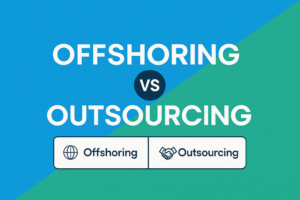The main difference is that staff augmentation adds external workers to your team under your full control, while consulting provides expert guidance with less direct oversight.
Staff augmentation means hiring an external company to supply specific skills. Their employees become fully part of your development cycle, and you maintain complete control over management.
Consulting, on the other hand, provides strategic advice from external experts. In this model, the consultants often have more control over how the work is done, meaning you don’t have the same level of direct oversight.
What’s the right one for your business? It’s all about understanding where your problem is coming from and then choosing the solution that is right for you. In our experience, staff augmentation brings the additional value of affordability, flexibility, and access to a much bigger pool of candidates when removing the requirement for candidates to be in the same physical office.
Let’s break down the difference so you can decide…Do you need immediate specialized resources, or an expert to help you see the big picture and improve your processes?
What’s Consulting and When Is Best to Use It?
The consulting company is a service that is meant to provide instruction, vision and tools. You come with a problem, and they come with the experts and the solution. They usually offer a larger variety of employees with different skills that relate to whatever the technical or non-technical need is.
When to Use Staff Augmentation Services?
Staff Augmentation is a service to fill corporate positions that are short on skill sets. This is a great resource if your company already has processes and management set up and just needs to fill certain gaps at a much lower cost than hiring locally. I
So, for example if you are missing developers to build a feature, you know what to build and how to build it, and you just need someone to build it, that’s when you choose the service of a staff augmentation company.
Staff Augmentation vs Consulting: What’s the Difference?
Staff augmentation is about getting more employees for your company. Consulting is about hiring experts to solve a problem. But let’s go in more detail on how they differ:
| Factor | Staff Augmentation | Consulting |
|---|---|---|
| Control | Full internal control | Lower—guided by consultant |
| Engagement model | Embedded talent, temporary or long-term | Independent, strategic, project-based |
| Cost structure | Pay for time/work | Fee-based, often higher but strategic benefits |
| Security & risk | Low—it operates under your protocols | Higher—you share data externally |
| Best use cases | Scaling teams, filling immediate gaps | Transformation, strategy, complex challenges |
1. Cost
Both options are cost-effective for different reasons and in different scenarios.
The staff augmentation model can save you financial resources by providing an expert without the maintenance costs associated with an employee, such as medical expenses. It is usually billed on a time and material basis (per hour or per day), so you pay for the time that the employee is dedicating to your project.
The consulting model can be based on a fixed price or time and material basis, or in terms of retainer when talking about a professional service type of organization. These companies are usually more costly, but they have the ability to provide many more services.
2. Control
In the staff augmentation model, you as a client have complete control over the development cycle, the process, and the employee. The employee becomes fully part of your team, and you can manage the employee in the same way you manage your own employees.
Consulting teams, on the other hand, will usually have a way to organize their work internally and has much more control. They usually have employees that, in many cases, manage a team within the client’s company, and they have much more control over the solution.
3. Flexibility
The staff augmentation model is very flexible. Employees can be hired for the duration that they are needed.
The consulting model, in many cases, is less flexible in terms of the people required and the type of skills needed to perform the task, and this can affect the cost.
4. Security
When you manage a staff augmentation hire under your processes, you control the way the new employee deals with your way of doing things. This ensures the proper implementation of security measures. Proper security implementation makes your team more security compliant and less of a security risk. Having your content within your process makes your staff more productive and you more secure.
The consulting model requires your company to open your infrastructure to people outside of the company, which can put your company more at risk.
Main Advantages and Disadvantages
Let’s review the main pros and cons of staff augmentation vs project based consulting and see how they compare.
| Facets | Staff Augmentation | Consulting |
| Cost-Effectiveness | Extremely cost-effective | Expensive, but still more cost-effective than building an in-house team |
| Infrastructure | Company will have to set up the infrastructure for the project itself | Provides the full infrastructure for the project to be carried out |
| Training | Needs training for the company’s inner processes and culture | No need for training |
| Management | Company will need to allocate resources to manage the new staff member | No need for extra management, the consulting team will take care of it |
| Control | Staff will follow the company’s workings and methodologies | The consulting team will have their own inner workings and methodologies |
| Communication | Always Available | Only available at certain times |
| Flexibility | Extremely flexible, can hire as needed | Teams may need specific people to function, which will limit their flexibility |
| Security | Sensitive data stays in-house, providing less points for security breaches | Sensitive data has to be accessible to an outside entity, possibly compromising its security |
What to Choose between Staff Augmentation and Consulting Services?
We created this questionnaire for you to help you decide which service suits you best:
Which Option is Right for You?
Conclusion
If you’re in a struggle, you might need both :). The consultant to come with the right vision and a staff augmentation team that will provide the resources to make this happen. Still, if you need to fill a gap in your team and you have a decent system in place, staff augmentation is a much better solution. But if you have no idea where to start or if you are dealing with bigger changes (like taking your company remote, which we will touch on later) a consulting company will likely provide a better overall solution.
So when you’re considering staff augmentation vs. consulting, the question is, what type of resources do you need?
Hiring people can be daunting, especially in the middle of a project. If you’re looking to hire people remotely, DistantJob can help you find the experienced developers you need. We provide support and remote staff for the top technologies used by IT companies, and we ensure that you’ll hire someone that fits your company’s culture to smoothen the transition.
Staff Augmentation staff can be considered consultants since they bring their development expertise to a company while not being directly affiliated with it. Consulting companies can offer both Staff Augmentation and Project-based Consulting services in their portfolio.
Managed IT Services provide a full-time staff member (or members) for the purposes of your business’ management and support. They gain control of not only the projects of their client but are also responsible for determining the skills and personnel needed for a project to succeed. They can also train people within the company to fill those roles and recommend and implement tools to help teams be more productive.
Managed Services provide people capable of viewing and assessing a company and its processes in a bigger picture, while Staff Augmentation is more about hiring experts for specific projects.






